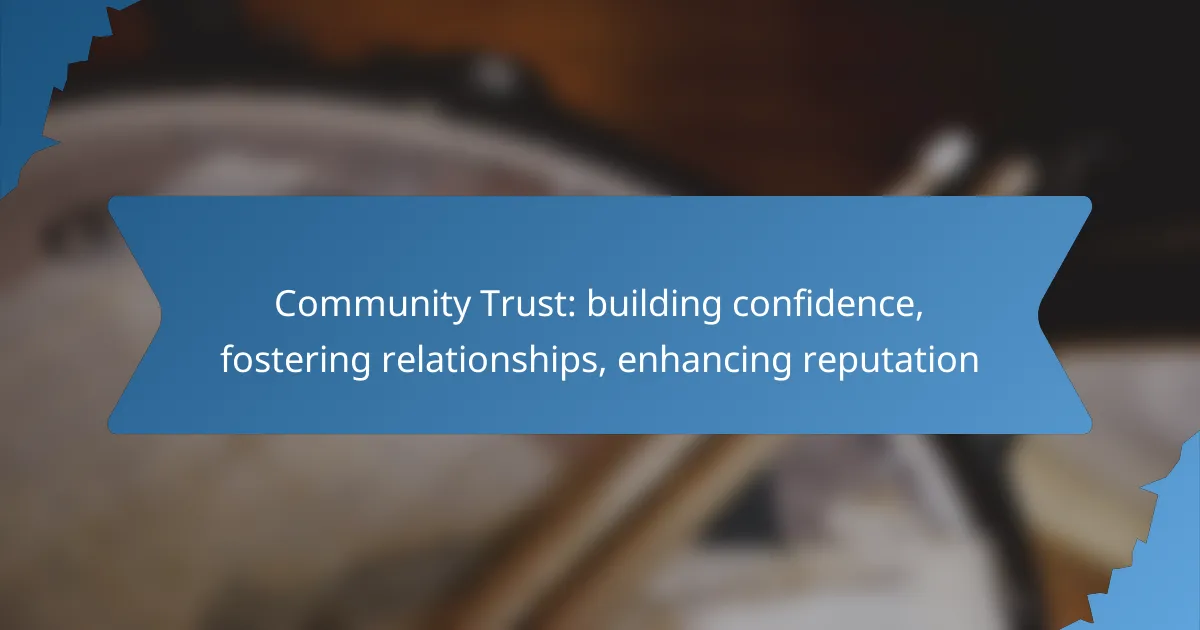Building community trust is essential for fostering strong relationships and enhancing the overall reputation of a neighborhood. By promoting open communication, engaging residents through events, and leveraging social media, communities can create a transparent and collaborative environment. These efforts not only strengthen connections among members but also attract new opportunities, leading to a more vibrant and resilient community.
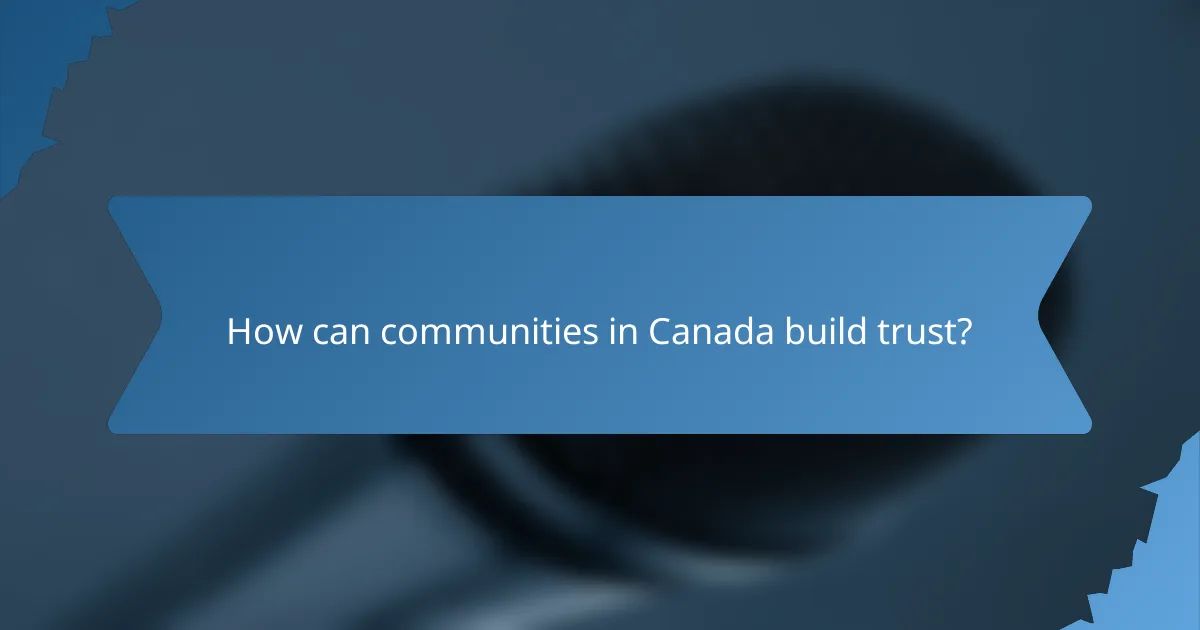
How can communities in Canada build trust?
Communities in Canada can build trust by fostering open communication, engaging residents through events, leveraging social media, and forming partnerships with local organizations. These strategies create a foundation of transparency and collaboration that enhances relationships and community reputation.
Transparent communication
Transparent communication is essential for building trust within communities. This involves sharing information openly about decisions, policies, and community issues, ensuring that residents feel informed and included.
Regular updates through newsletters, community meetings, or public forums can help maintain transparency. Utilizing clear language and avoiding jargon makes information accessible to all community members.
Engagement through local events
Organizing local events is a powerful way to engage community members and build trust. Events such as town hall meetings, festivals, or volunteer days encourage participation and foster a sense of belonging.
When planning events, consider the interests of diverse groups within the community. Offering activities for all ages and backgrounds can enhance participation and strengthen relationships among residents.
Utilizing social media platforms
Social media platforms are effective tools for building trust in communities. They allow for real-time communication and provide a space for residents to voice their opinions and concerns.
Communities should maintain active and responsive social media accounts, sharing updates, celebrating local achievements, and addressing issues promptly. This two-way communication fosters a sense of connection and accountability.
Partnerships with local organizations
Forming partnerships with local organizations can significantly enhance community trust. Collaborating with schools, non-profits, and businesses allows for resource sharing and joint initiatives that benefit the community.
These partnerships can lead to programs that address specific community needs, such as youth mentorship or environmental clean-ups. Engaging various stakeholders demonstrates a commitment to collective well-being and strengthens community ties.

What are effective strategies for fostering relationships?
Effective strategies for fostering relationships within a community include regular engagement through meetings, creating volunteer opportunities, and establishing mentorship programs. These approaches help build trust, enhance communication, and strengthen connections among community members.
Regular community meetings
Regular community meetings provide a platform for open dialogue, allowing members to share their thoughts and concerns. These gatherings can be held monthly or quarterly, depending on community size and needs.
To maximize participation, consider varying the meeting times and locations. Providing refreshments or virtual attendance options can also encourage attendance and engagement.
Volunteer opportunities
Creating volunteer opportunities helps individuals connect through shared goals while contributing to community development. Projects can range from neighborhood clean-ups to organizing local events, catering to diverse interests and skills.
Promote these opportunities through social media, local newsletters, or community boards. Recognizing volunteers publicly can further enhance their commitment and strengthen relationships.
Mentorship programs
Mentorship programs pair experienced community members with those seeking guidance, fostering personal and professional growth. These programs can be structured around specific skills, career paths, or personal development goals.
To implement a successful mentorship program, establish clear objectives and ensure regular check-ins between mentors and mentees. Providing training for mentors can enhance the effectiveness of the program and encourage meaningful connections.
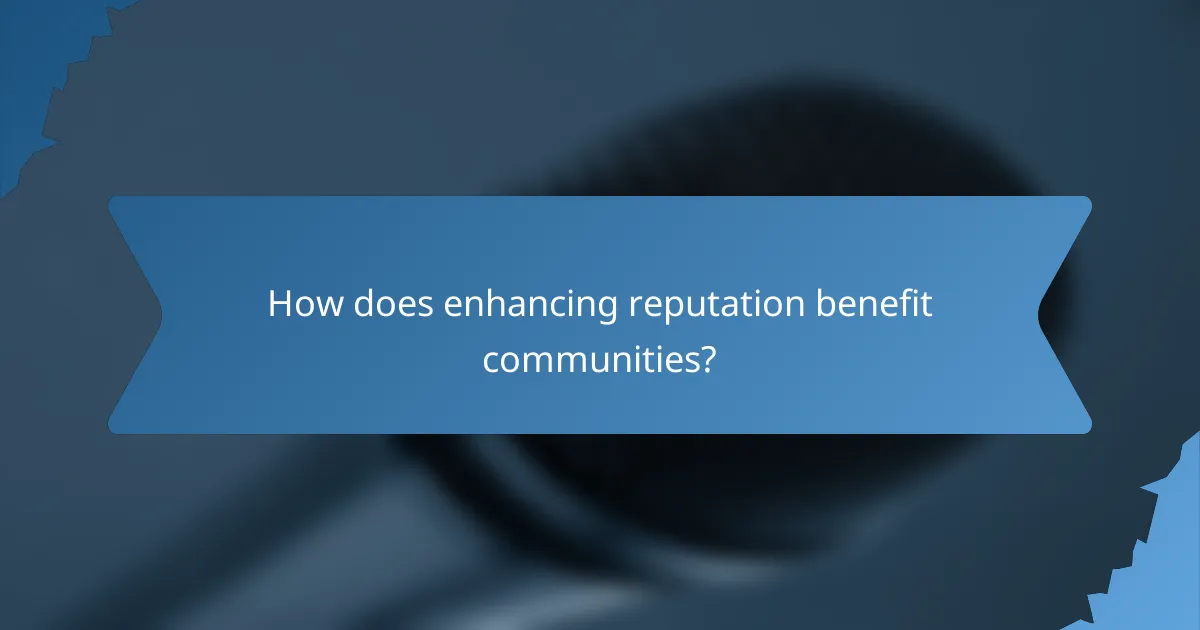
How does enhancing reputation benefit communities?
Enhancing a community’s reputation builds confidence among residents and attracts new opportunities. A strong reputation fosters relationships, encourages civic engagement, and ultimately leads to a more vibrant and resilient community.
Attracting new residents
A positive reputation makes a community more appealing to potential residents. People often look for neighborhoods with good schools, low crime rates, and active community involvement, which are all indicators of a strong reputation.
Communities can enhance their image through local events, volunteer opportunities, and showcasing success stories. For example, hosting neighborhood festivals or clean-up days can highlight the community’s commitment to improvement and attract newcomers.
Boosting local businesses
When a community has a solid reputation, local businesses benefit from increased foot traffic and customer loyalty. Residents are more likely to support businesses that contribute positively to the community, creating a cycle of mutual support.
To leverage this, communities can promote local businesses through social media campaigns or community directories. Collaborations between businesses for events or promotions can also enhance visibility and strengthen community ties.
Improving community morale
A strong reputation fosters a sense of pride among residents, leading to improved community morale. When individuals feel proud of their community, they are more likely to engage in local activities and support one another.
Communities can boost morale by recognizing achievements, celebrating diversity, and encouraging participation in local governance. Regular community meetings can provide a platform for residents to voice their opinions and feel valued, further enhancing the overall atmosphere.
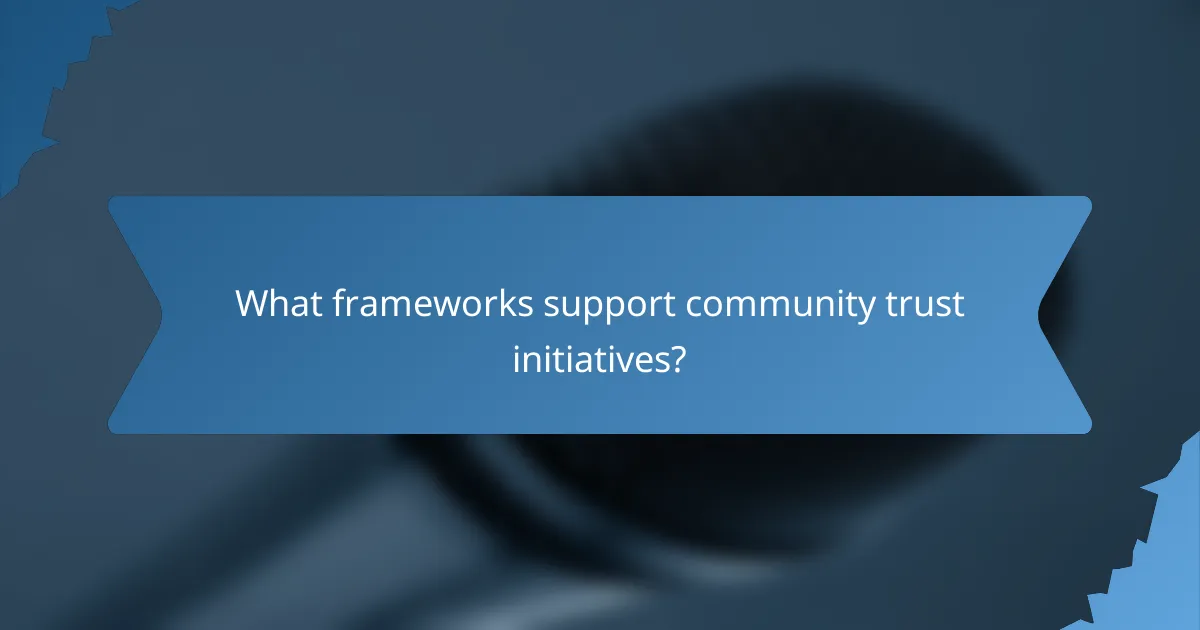
What frameworks support community trust initiatives?
Community trust initiatives are often supported by various frameworks designed to enhance relationships and build confidence among members. These frameworks typically focus on engagement, transparency, and collaboration, enabling communities to foster a positive reputation and strengthen social bonds.
Community engagement models
Community engagement models provide structured approaches for involving community members in decision-making processes. These models often include strategies such as participatory budgeting, where residents have a say in how local funds are allocated, and community forums that encourage open dialogue.
When implementing engagement models, consider the diversity of your community to ensure all voices are heard. Utilizing surveys or focus groups can help identify key issues and areas for improvement, fostering a sense of ownership among participants.
Trust-building workshops
Trust-building workshops are interactive sessions aimed at enhancing relationships within a community. These workshops often include activities that promote communication, conflict resolution, and collaborative problem-solving, helping participants develop mutual respect and understanding.
To maximize the effectiveness of trust-building workshops, ensure they are tailored to the specific needs of your community. Incorporating real-life scenarios and role-playing exercises can make the experience more relatable and impactful. Regular follow-up sessions can also reinforce the skills learned and maintain momentum in building trust.
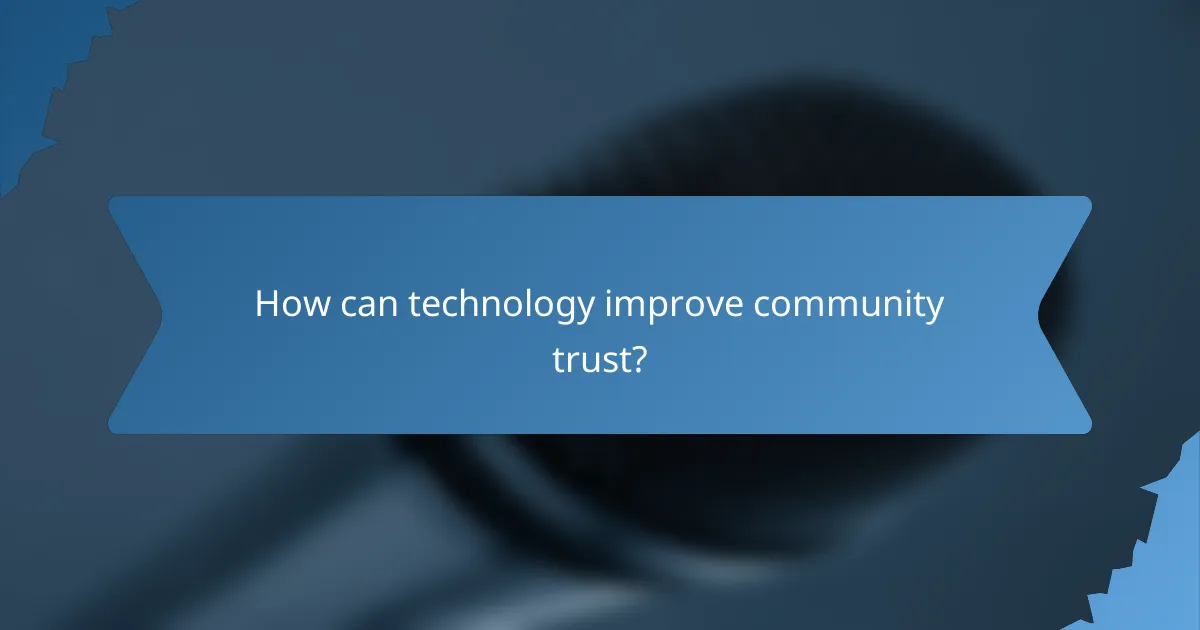
How can technology improve community trust?
Technology can significantly enhance community trust by facilitating transparency, encouraging open communication, and providing platforms for feedback. By leveraging digital tools, communities can foster stronger relationships and improve their overall reputation.
Online feedback platforms
Online feedback platforms allow community members to share their opinions and experiences, which can help organizations understand public sentiment. These platforms often include surveys, reviews, and ratings that provide valuable insights into community needs and expectations.
When implementing feedback platforms, ensure they are user-friendly and accessible to all community members. Consider using tools like Google Forms or SurveyMonkey for surveys, and Yelp or TripAdvisor for reviews, as these are widely recognized and trusted.
To maximize effectiveness, regularly monitor feedback and respond promptly. This shows that the community values input and is committed to making improvements based on suggestions.
Community apps for communication
Community apps enhance communication by providing a centralized space for information sharing and engagement. These apps can include features like event calendars, discussion forums, and direct messaging, making it easier for residents to connect with each other and local organizations.
When choosing a community app, consider options like Nextdoor or WhatsApp, which are popular for neighborhood interactions. Ensure the app is secure and respects user privacy to build trust among participants.
Encourage active participation by promoting the app through local events and social media. Regularly update the app with relevant content to keep users engaged and informed about community happenings.

What role do local leaders play in building trust?
Local leaders are pivotal in building trust within communities by fostering open communication and demonstrating integrity. Their actions and decisions can significantly influence how residents perceive each other and their local institutions.
Influencing community values
Local leaders shape community values by promoting principles such as transparency, inclusivity, and accountability. By actively engaging with residents and encouraging dialogue, they can instill a sense of shared purpose and collective responsibility.
For instance, leaders can organize community forums or workshops to discuss local issues, allowing residents to voice their concerns and contribute to solutions. This participatory approach not only enhances trust but also aligns community values with the needs and aspirations of its members.
Leading by example
Leading by example is crucial for local leaders to build trust. When leaders demonstrate ethical behavior and follow through on commitments, they set a standard for others to emulate. This consistency fosters a culture of trustworthiness within the community.
For example, if a local leader advocates for environmental sustainability, they should also implement eco-friendly practices in their own initiatives. This alignment between words and actions reinforces credibility and encourages residents to adopt similar values.
